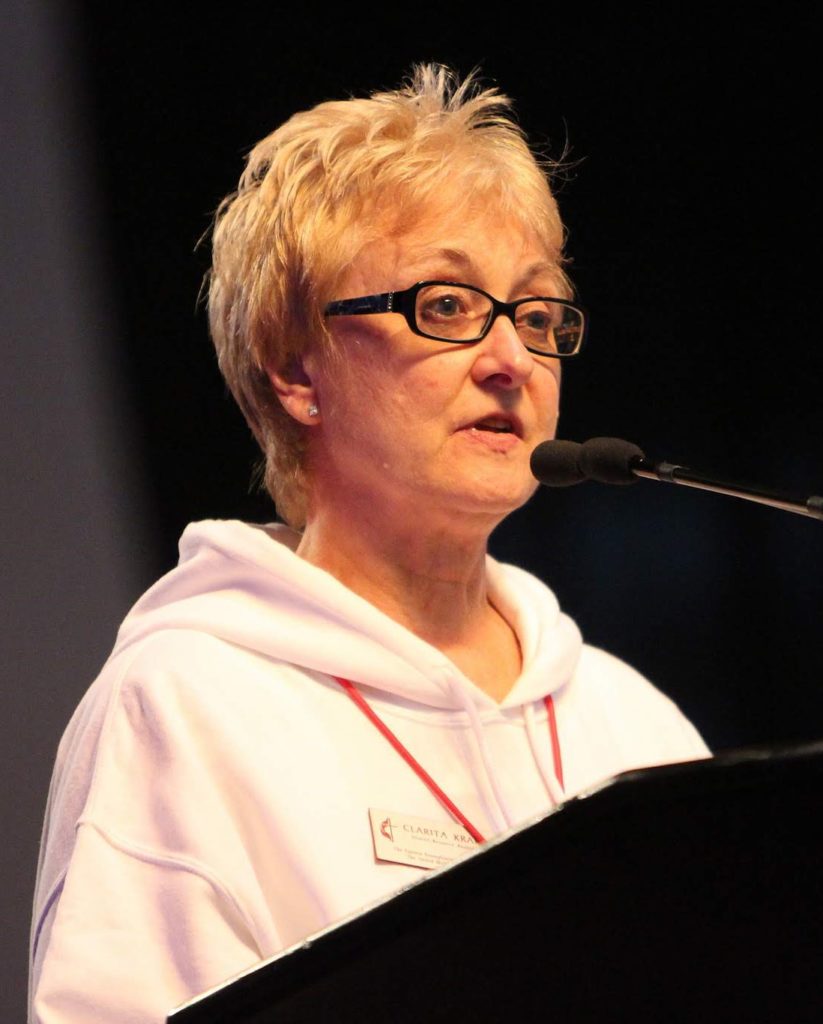By Clarita Anderman Krall
Numbness!
Disbelief!
Profound disappointment!
Frustration!
Utter sadness!
Depression!
Mourning!

Anger and a call to arms, figuratively speaking, to continue the quest for full inclusion of LGBTQIA+ United Methodists in their own church! This struggle for God’s justice is not over!
These were the range of emotions that I felt and thoughts that I had after the Traditional Plan was approved on Tuesday, February 26th, by a close vote of 438 to 384, a mere 54 votes difference. If only 28 more delegates had voted to defeat the Traditional Plan, it would not have passed.
As I listened to the delegates who spoke in favor of the Traditional Plan, it was my pained observation and understanding that, often, their views were expressed as an indication of our Church needing to be “biblically observant.” It made me feel as if those delegates do not believe that persons with a different opinion are being “biblically observant,” when it is rather the case that United Methodists of devout faith just DO NOT AGREE and do not always interpret scripture with the same point of view. Throughout the history of Christianity, Biblical criticism is an area of study that exists because of differing understandings within the faith.
The oft quoted scripture supporting the position that same gender relations are outside acceptability within church teaching are passages in which Jesus is asked a question about divorce. (See Matthew 19 and Mark 10.) At that time in social history, there was not a legal recognition of same gender marriages. Had there been recognition, Jesus’ teaching on divorce would, most probably, have been all-inclusive. Yet, the United Methodist Church has found a way to accept persons who have been divorced as members and clergy in churches. Revered Old Testament figures practiced polygamy and kept concubines. However, these practices do not sit well today in our 21st Century North American practice of United Methodism.
Even John Wesley, founder of the Methodist movement, did not always agree with George Whitefield, another cleric in the early Methodist movement, particularly on the theology of atonement. They “agreed to disagree.” I cannot understand why our denomination cannot continue in that tradition of agreeing to disagree on something that has nothing to do with making disciples of Jesus Christ.
Bible students understand that there are various ways to interpret scripture, dependant on historical, societal, and cultural differences. When the Pharisees learned how Jesus was answering the Sadducees, they piled on and sent their best religion scholar to ask him about which command in God’s law is the most important. He answered, “’Love the Lord your God with all your passion and prayer and intelligence.’ This is the most important, the first on any list. But there is a second to set alongside it: ‘Love others as well as you love yourself.’ These two commands are pegs; everything in God’s Law and the Prophets hangs from them.” (Matthew 22:37-40, The Message translation)
Not accepting the LGBTQIA+ community, as God created the community, flies in the face of Jesus’ second commandment. I do not believe that the Book of Discipline of The United Methodist Church, since 1972, has been in keeping with Jesus’ commandments.
